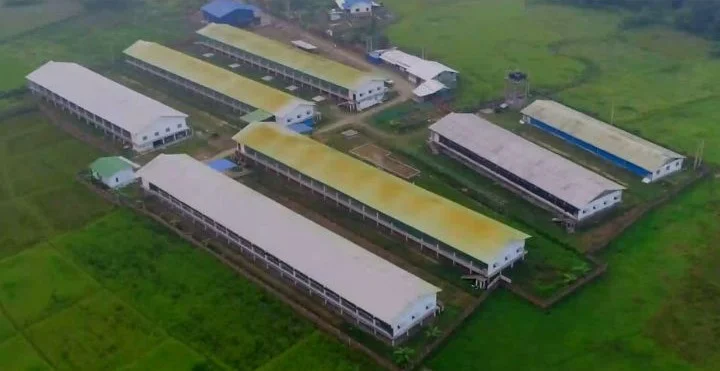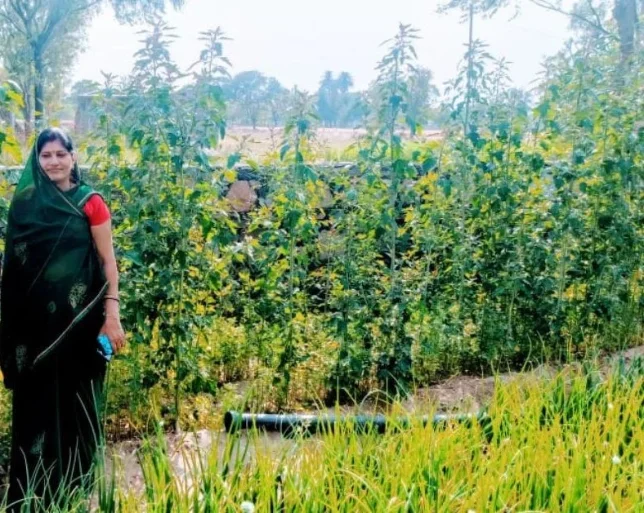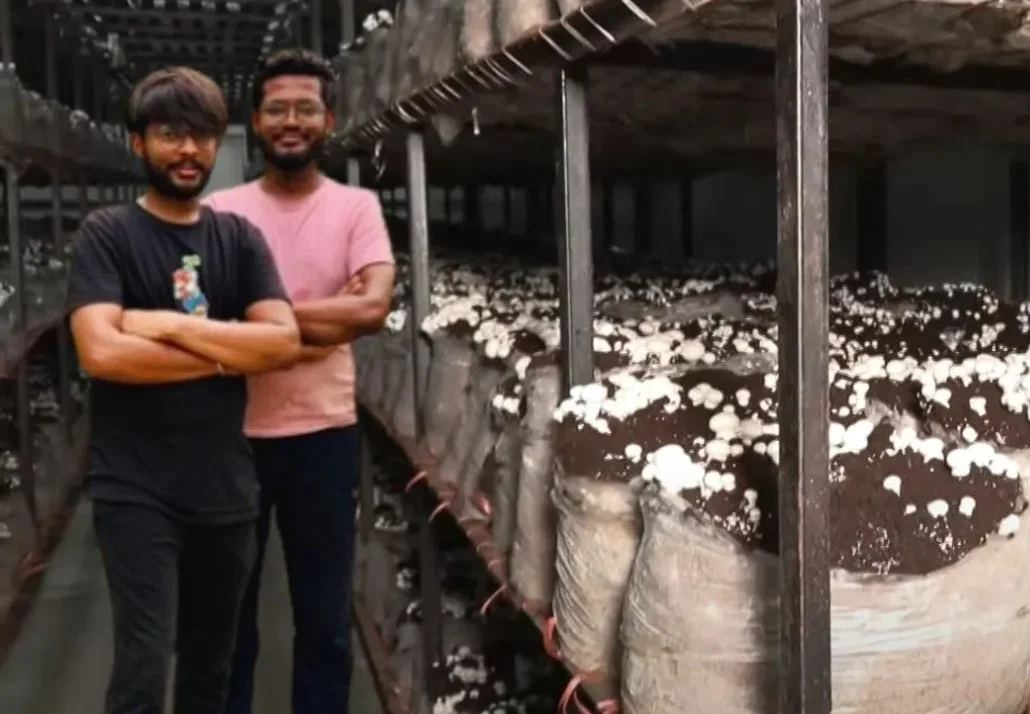Akash Jyoti Gogoi is a unique entrepreneur. In 2001, right after graduating from Bengaluru University with a computer science degree, he dove into the world of techno-entrepreneurship. Returning home, he established a technology services company in Jorhat, Assam.
It was a journey to Europe in 2014 that opened Akash’s eyes to the possibilities in the dairy, meat, and egg production industry. Recognizing the shortage of fresh eggs in Assam, he saw an opportunity and decided to enter the field of layer poultry farming for egg production in 2017.

Layer poultry farming is all about raising chickens specifically for producing eggs on a commercial scale. These chickens, known as layers, are a particular breed of hens. The process begins by raising them from just one day old, and they typically start laying eggs around 18 to 19 weeks of age.
Closing the gap in Assam’s egg shortage
“I observed a notable disparity in the Assam market, where eggs were mainly coming from other states, taking almost seven days to reach consumers. Fresh eggs were scarce in the state, with local production meeting less than 10 percent of the demand,” he explains.
As per the Animal Husbandry and Veterinary Department of the Assam Government, the state produces approximately 47.50 crore eggs annually, falling significantly short of the required 560 crores. This creates an annual deficit of 512.5 crores eggs, which need to be procured from other states.

For about 6 to 7 months, Akash delved into the feasibility of starting an egg production business. “I traveled to various places in Tamil Nadu, particularly Namakkal, known as the ‘egg city,’ Andhra Pradesh, Karnataka, and Telangana to grasp how layer egg farms operate,” he recalls.
With newfound knowledge about layer poultry farming, he established his company, North East Agro Products and Services, in Jorhat, selling eggs under the Bahuboli brand. “Production kicked off in 2018,” the entrepreneur shares.
To fund this venture, Akash used some of his savings and secured an initial bank loan of Rs 3 crore, channeling around Rs 10 crore into a single farm. This sum does not include the cost of the land, which he already owned. In 2021, he further invested Rs 10 crore to launch his second farm.
At the beginning, we were producing about 20,000 eggs each day. Currently, our two farms, each spanning two acres, accommodate 1.2 lakh hens and generate approximately one lakh eggs every day.
The distinctive feature of Bahuboli eggs.
“When I began, folks were taken aback by the idea of branding eggs, as they thought ‘an egg is an egg.’ But our eggs, unlike those brought in from other states, make it to consumers’ kitchens the day after they’re produced,” he explains.

Fresh eggs are richer in nutrients compared to older ones, as the nutritional value diminishes over time. “As people got familiar with the superior quality, their perception shifted. Now, in stores, instead of just requesting eggs, people specifically inquire about Bahuboli eggs. It’s a significant milestone for us,” says Akash, expressing his pride.
In his view, Bahuboli eggs stand out for their superior quality, and they weigh more than the average eggs. Choosing the brand name Baahubali, known for strength, was a deliberate decision.
Also Read: This ‘Family Farmer’ helps you eat right with organic farming and traditional wisdom
“A typical egg weighs about 52-53 grams, whereas a Bahuboli egg ranges from 58-62 grams.”
During the initial stages, some retailers deceitfully sold regular eggs as Bahuboli eggs. “This pushed me to emphasize branding; I made the choice to imprint our brand name and logo on every egg,” he adds.
Sales and revenues
Bahuboli eggs find their way to wholesalers and distributors in Assam and certain parts of Nagaland. Each egg is typically sold for around Rs6, subject to fluctuations in the wholesale market.

When it comes to retail, regular eggs are usually priced at about Rs8 each, whereas Bahuboli eggs are slightly higher at Rs9. “With a daily production of around a lakh eggs, we generate an annual revenue ranging from Rs20 crore to Rs22 crore. However, the income varies based on market conditions,” he explains.
Akash has also established an organic bio-fertilizer business called Thon Dhora, utilizing hen waste. “The annual income from bio-fertilizers is around Rs40-50 lakh,” adds Akash.
Layer egg farm
For his layer egg farming, Akash acquires BV300 breed chickens from Venky’s, a well-known name in the poultry hatcheries industry. The cost is approximately Rs 40 to Rs 50 per chick.
Given that layer farming involves nurturing chickens from the day they hatch, it’s crucial to provide them with proper nutrition and care.
“The quality of an egg depends on the nutritious feed the hen consumes, its health, and the clean environment it grows in. That’s why we exclusively produce the highest quality feed in-house for our hens,” he emphasizes.
Bahuboli has a dedicated team of around 100 members who consistently monitor the hens, administer vaccines, provide feed and water, and ensure the farm maintains proper hygiene, according to Akash.
Challenges faced in poultry farming in Assam.
Akash points out the challenges faced in the egg business in Assam, primarily due to the prevailing weather conditions. The high humidity becomes a significant hurdle as it’s not ideal for raising layer hens.
The humidity in Assam makes the hens more susceptible to diseases, requiring constant care and attention to manage risks.
“Unlike other production firms, our farm cannot afford even a single day of closure. Continuous operation demands a reliable workforce, and the shortage of labor is another challenge in this region,” he emphasizes.

Furthermore, the farm operations, from setting up to environmentally friendly waste disposal, require significant land resources. “The scarcity of available land in Assam also becomes a pressing concern,” notes Akash.
Giving priority to cleanliness and sustainable practices
Akash initiated the organic bio-fertilizer venture Thon Dhora with the goal of tackling waste disposal challenges. Presently, approximately 2,000 metric tonnes of bio-fertilizers are sold each year, suitable for use in paddy fields, tea estates, and gardens.
“In recent years, I’ve noticed that eight egg farms, which started operations after us, had to shut down due to their inability to control air pollution, causing concerns in nearby villages,” he observes.
“Hence, it’s crucial to find practical solutions to address this issue. I can confidently say that our farm is one of the cleanest. There’s no unpleasant odor, and we adhere to stringent cleanliness and ventilation standards,” he adds.
Expansion Plan
Akash is gearing up to introduce a retail outlet called Bahuboli 7-9 in Assam. Beyond eggs, this store will offer milk, chicken, and various other items. “Moreover, I’m in talks for collaborations to set up another layer farm since our current farms are running at full capacity. This expansion is geared towards increasing production and catering to a broader market,” shares Akash.
“As a first-generation entrepreneur facing substantial risks without the support of government subsidies, establishing this business hasn’t been an easy journey,” he acknowledges.
“However, it’s the commitment and determination to succeed in this field that keep me moving forward. For anyone contemplating starting an egg production farm, be prepared for unwavering dedication and attention,” Akash concludes.









